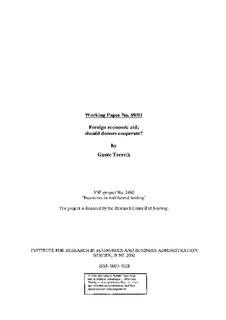| dc.contributor.author | Torsvik, Gaute | |
| dc.date.accessioned | 2006-07-20T09:34:52Z | |
| dc.date.available | 2006-07-20T09:34:52Z | |
| dc.date.issued | 2002-06 | |
| dc.identifier.issn | 1503-2140 | |
| dc.identifier.uri | http://hdl.handle.net/11250/165862 | |
| dc.description.abstract | When several altruistic donors provide aid to alleviate poverty in another country, they face a common good problem. Solving this problem calls for cooperation and policy integration. But before we conclude in favour of cooperation, we should be aware that mutual aid might have negative effects on domestic policy in the receiving country. The more united and responsible donors act towards the poor in the receiving country, the less responsible does the receiving government act. I study these two countervailing effects of donor cooperation in different settings. I find that cooperation is always beneficial if aid can be provided with a complete contingent contract. If contracts cannot be used, I show that cooperation can be harmful. The most surprising result is that the negative effect of donor cooperation – the crowding out of domestic support to the poor – is less pronounced if donors face a Samaritan’s dilemma. | en |
| dc.format.extent | 657650 bytes | |
| dc.format.mimetype | application/pdf | |
| dc.language.iso | eng | en |
| dc.publisher | SNF | en |
| dc.relation.ispartofseries | Working Paper | en |
| dc.relation.ispartofseries | 2001:69 | en |
| dc.title | Foreign economic aid : should donors cooperate? | en |
| dc.type | Working paper | en |
